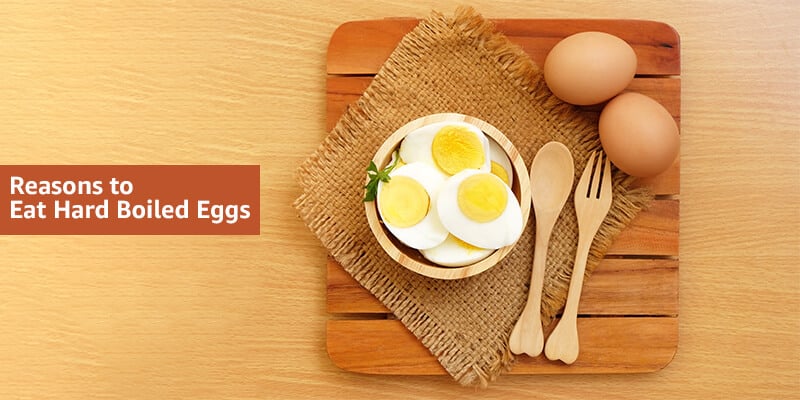
Hard boiled eggs are a nutritious and delicious food that can be enjoyed in a variety of ways. Whether you enjoy them as a quick and easy snack or use them to add protein to your favorite dishes, hard boiled eggs are a great source of essential nutrients. In this blog, we will explore the nutrition facts of hard-boiled eggs, types of hard boiled eggs and their health benefits.
Health Benefits of Hard Boiled Eggs

1.High-Quality Protein
One large hard-boiled egg contains approximately 6 grams of protein, which can help you feel full and satisfied. Protein is essential for building and repairing muscles and tissues, and can also help regulate blood sugar levels.
2. Heart-Healthy Fats
While eggs are often associated with high cholesterol levels, research has shown that consuming eggs in moderation can actually be beneficial for heart health. The healthy fats in eggs can help reduce inflammation and improve cholesterol levels.
3. Essential Vitamins and Minerals
Hard-boiled eggs are a good source of several essential vitamins and minerals, including vitamin A, vitamin D, vitamin B12, and iron. These nutrients are important for maintaining healthy bones, immune function, and energy levels.
4. Weight Management
Hard-boiled eggs are low in calories and high in protein, which can help you feel full for longer and reduce cravings. Incorporating hard-boiled eggs into your diet can help support weight loss and weight management goals. They are a fantastic alternative because they are likewise low in carbohydrates.
Types of Hard-Boiled Eggs
There are different types of hard-boiled eggs that you can choose from. Here are some of them:
1.Organic Hard Boiled Eggs
Organic hard-boiled eggs come from chickens that have been raised without antibiotics, hormones, or genetically modified feed. They are a good option for those who want to avoid consuming these additives.
2. Cage-free Hard Boiled Eggs
Cage-free hard-boiled eggs come from chickens that are not kept in cages. They are allowed to move around and engage in natural behaviors. This can result in better living conditions for the chickens and potentially higher quality eggs.
3. Free-range Hard Boiled Eggs
Free-range hard-boiled eggs come from chickens that have access to the outdoors. They are allowed to move around, forage for food, and engage in natural behaviors. This can result in higher quality eggs with potentially higher nutrient levels.
4. Omega-3 Hard Boiled Eggs
Omega-3 hard-boiled eggs come from chickens that have been fed a diet high in omega-3 fatty acids. This can result in eggs with higher levels of omega-3s, which are beneficial for heart health and brain function.
Overall, choosing high-quality hard-boiled eggs can result in a more nutritious and satisfying eating experience.
Also Read: Beneficial Egg Nutrition Facts Of 6 Types Of Eggs
Ways to Incorporate Hard Boiled Eggs Into Your Diet

There are many ways to incorporate hard-boiled eggs into your diet. Here are some ideas:
- As a snack: Hard-boiled eggs make a quick and easy snack that you can enjoy on the go. Simply peel and eat!
- On a salad: Slice hard-boiled eggs onto a bed of greens for a protein-packed salad.
- In a sandwich: Chop hard-boiled eggs and mix with mayonnaise and your favorite seasonings for a delicious egg salad sandwich.
- In a breakfast bowl: Top a bowl of cooked quinoa or brown rice with sliced hard-boiled eggs, avocado, and salsa for a nutritious and satisfying breakfast.
Hard-boiled eggs are a nutritious and delicious food that can be enjoyed in many ways. Whether you enjoy them as a snack or use them to add protein to your favorite dishes, hard-boiled eggs are a great source of essential nutrients. Incorporating hard-boiled eggs into your diet can help support weight management, provide high-quality protein, and improve overall health.
Nutrition Facts of Hard Boiled Eggs:
One large hard-boiled egg (50 grams) contains:
- Calories: 78
- Protein: 6 grams
- Fat: 5 grams
- Carbohydrates: 0.6 grams
- Fiber: 0 grams
- Cholesterol: 212 milligrams
- Sodium: 62 milligrams
- Potassium: 63 milligrams
- Vitamin A: 6% of the Daily Value (DV)
- Calcium: 2% of the DV
- Iron: 4% of the DV
- Vitamin D: 7% of the DV
- Vitamin B12: 9% of the DV
As you can see, hard boiled eggs are a good source of high-quality protein, healthy fats, and a variety of vitamins and minerals. For individuals on a low-carb or ketogenic diet.
Safety Considerations
When consuming hard boiled eggs, it is important to take safety precautions to prevent foodborne illness. Here are some tips to keep in mind:
- Store eggs properly: Hard-boiled eggs should be stored in the refrigerator in an airtight container. This can help prevent bacterial growth and keep them fresh.
- Check for freshness: Before boiling eggs, check for freshness by placing them in a bowl of water. Older eggs will float, whereas fresh eggs will sink to the bottom.
- Cook eggs thoroughly: Hard-boiled eggs should be cooked for at least 12 minutes to ensure that they are fully cooked and safe to eat.
- Avoid consuming eggs that are cracked or damaged: Cracked or damaged eggs can increase the risk of bacterial contamination.
Summary
A wholesome and adaptable food, hard boiled eggs can be eaten in a variety of ways. They are a good source of high-quality protein, heart-healthy fats, and essential vitamins and minerals.
Incorporating hard-boiled eggs into your diet can help support weight management, provide sustained energy, and improve overall health. Choosing high-quality eggs and taking safety precautions can help ensure that you are getting the most out of this nutritious food.
Leave a Reply
You must be logged in to post a comment.